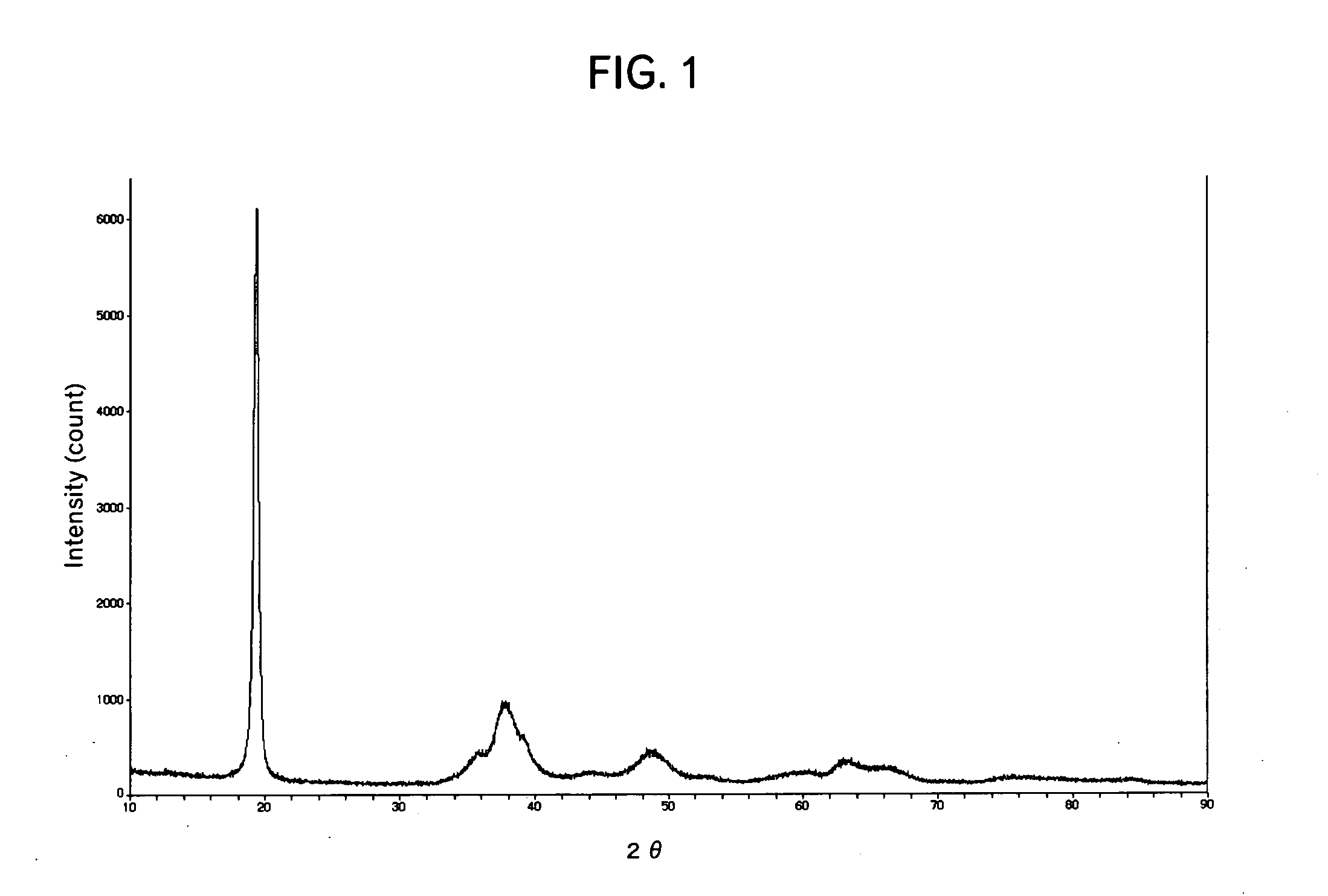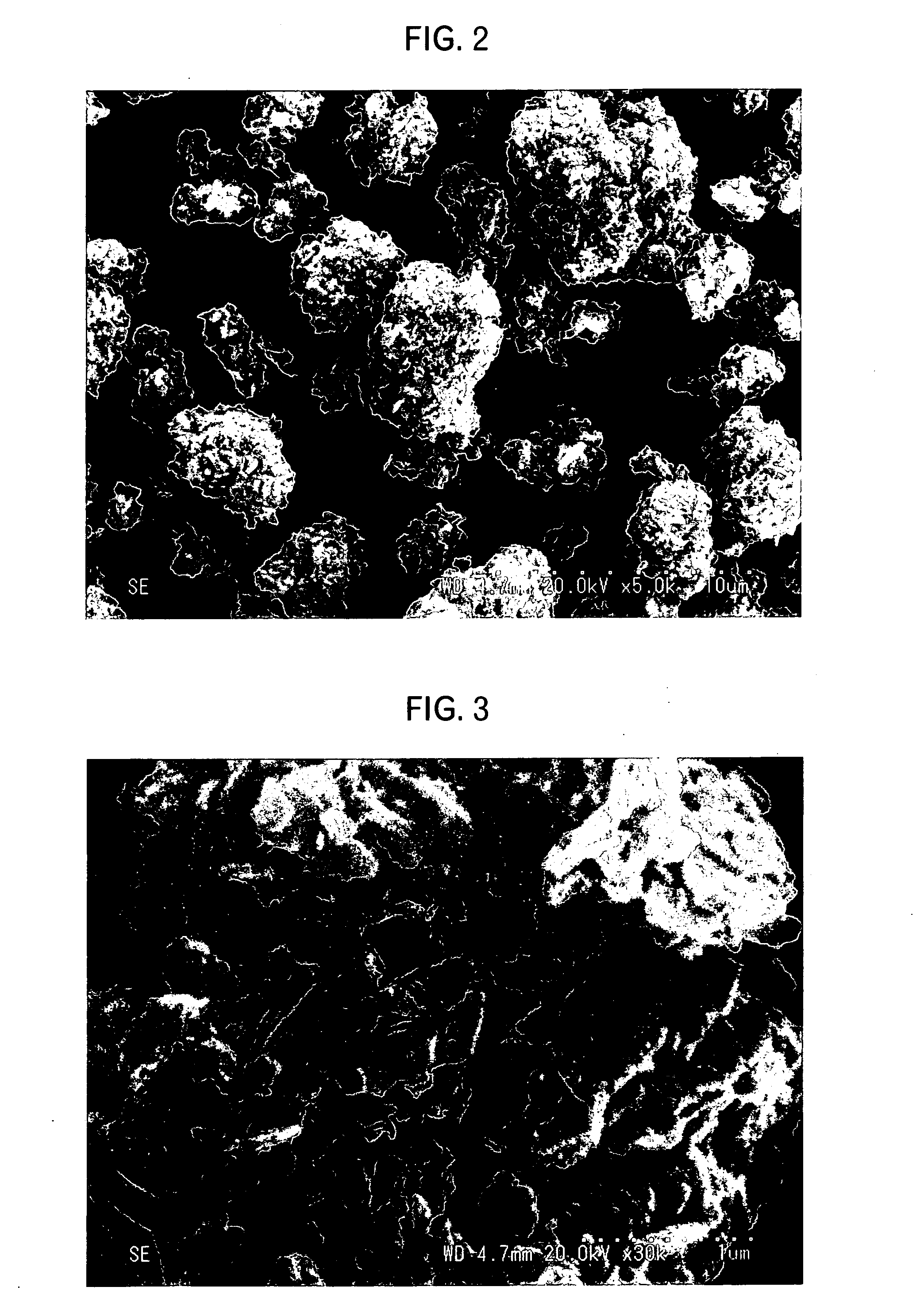Lithium-nickel-cobalt-maganese containing composite oxide, material for positive electrode active material for lithium secondary battery, and methods for producing these
a technology of lithium secondary battery and composite oxide, which is applied in the direction of nickel compounds, manganates/permanentates, cell components, etc., can solve the problems of high cost of active materials, easy cell generation of heat, and excessive proceeds, so as to reduce service capacity and safety. , the effect of reducing the service capacity
- Summary
- Abstract
- Description
- Claims
- Application Information
AI Technical Summary
Benefits of technology
Problems solved by technology
Method used
Image
Examples
example 1
[0053] In a 2-L (liter) reaction vessel, ion-exchanged water is poured, and agitated at 400 rpm while maintaining the internal temperature at 50±1° C. To this, while supplying an aqueous solution of metal sulfates containing 1.5 mol / L of nickel sulfate, 1.5 mol / L of manganese sulfate and 1.5 mol / L of cobalt sulfate at a flow rate of 0.4 L / hr; and simultaneously supplying a 1.5 mol / L aqueous solution of ammonium sulfate at a flow rate of 0.03 L / hr; an 18 mol / L aqueous solution of sodium hydroxide was continuously supplied so that the pH in the reaction vessel was maintained at 11.05±0.05. The mother liquor in the reaction vessel was periodically extracted, and the slurry was concentrated until the final slurry concentration became about 700 g / L. The nickel concentration in the periodically extracted mother liquor from the reaction vessel was 20 ppm. After the target slurry concentration had been obtained, the slurry was aged at 50° C. for 5 hours, filtration and water washing were re...
example 2
[0068] In a 2-L (liter) reaction vessel, 1.8 L of the mother liquor obtained in the above-described Example 1 was poured, and agitated at 250 rpm while maintaining the internal temperature at 50±1° C. To this, while supplying an aqueous solution of metal sulfates containing 1.5 mol / L of nickel sulfate, 1.5 mol / L of manganese sulfate and 1.5 mol / L of cobalt sulfate at a flow rate of 0.4 L / hr; and simultaneously supplying a 1.5 mol / L aqueous solution of ammonium sulfate at a flow rate of 0.03 L / hr; an 18 mol / L aqueous solution of sodium hydroxide was continuously supplied so that the pH in the reaction vessel was maintained at 11.05±0.05. The mother liquor in the reaction vessel was periodically extracted, and the slurry was concentrated until the final slurry concentration became about 1000 g / L. The nickel concentration in the periodically extracted mother liquor from the reaction vessel was 22 ppm. After the target slurry concentration had been obtained, the slurry was aged at 50° C...
PUM
| Property | Measurement | Unit |
|---|---|---|
| temperature | aaaaa | aaaaa |
| temperature | aaaaa | aaaaa |
| specific surface area | aaaaa | aaaaa |
Abstract
Description
Claims
Application Information
 Login to View More
Login to View More - R&D
- Intellectual Property
- Life Sciences
- Materials
- Tech Scout
- Unparalleled Data Quality
- Higher Quality Content
- 60% Fewer Hallucinations
Browse by: Latest US Patents, China's latest patents, Technical Efficacy Thesaurus, Application Domain, Technology Topic, Popular Technical Reports.
© 2025 PatSnap. All rights reserved.Legal|Privacy policy|Modern Slavery Act Transparency Statement|Sitemap|About US| Contact US: help@patsnap.com


